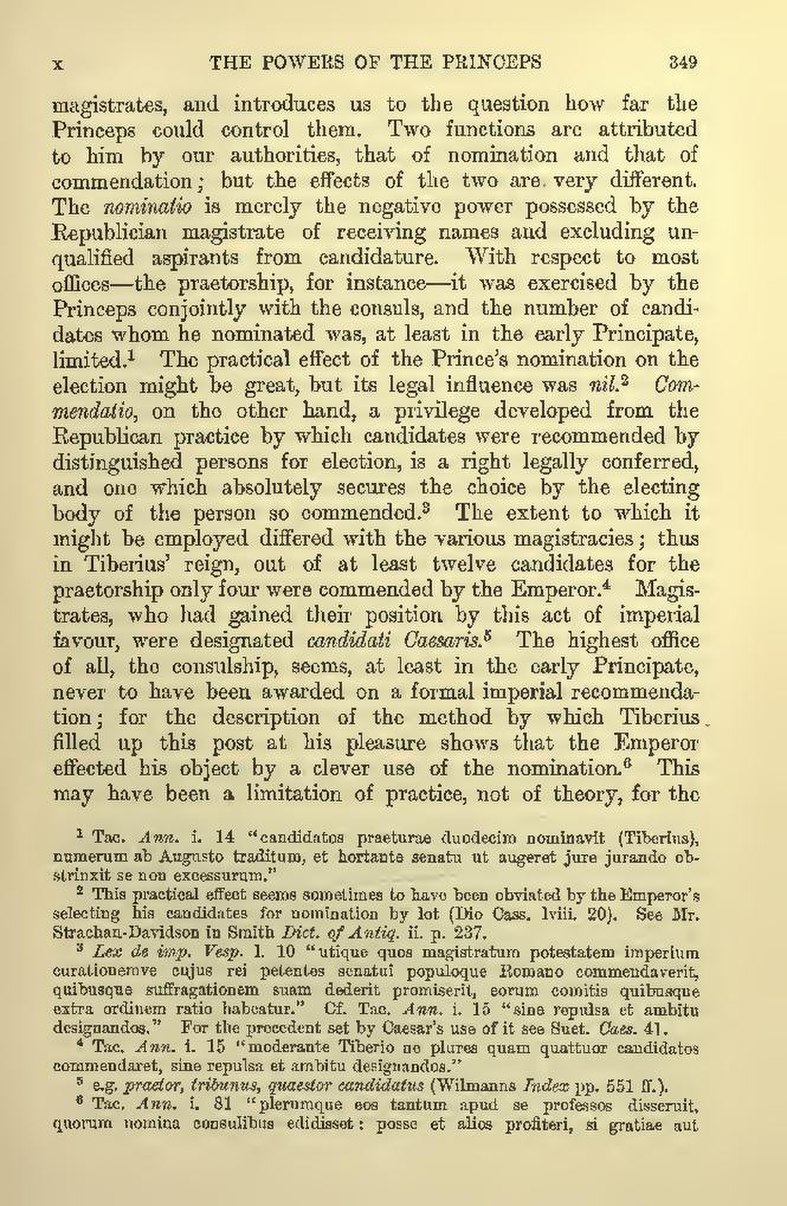magistrates, and introduces us to the question how far the Princeps could control them. Two functions are attributed to him by our authorities, that of nomination and that of commendation; but the effects of the two are very different. The nominatio is merely the negative power possessed by the Republican magistrate of receiving names and excluding unqualified aspirants from candidature. With respect to most offices—the praetorship, for instance—it was exercised by the Princeps conjointly with the consuls, and the number of candidates whom he nominated was, at least in the early Principate, limited.[1] The practical effect of the Prince's nomination on the election might be great, but its legal influence was nil.[2] Commendatio, on the other hand, a privilege developed from the Republican practice by which candidates were recommended by distinguished persons for election, is a right legally conferred, and one which absolutely secures the choice by the electing body of the person so commended.[3] The extent to which it might be employed differed with the various magistracies; thus in Tiberius' reign, out of at least twelve candidates for the praetorship only four were commended by the Emperor.[4] Magistrates, who had gained their position by this act of imperial favour, were designated candidati Caesaris.[5] The highest office of all, the consulship, seems, at least in the early Principate, never to have been awarded on a formal imperial recommendation; for the description of the method by which Tiberius filled up this post at his pleasure shows that the Emperor effected his object by a clever use of the nomination.[6] This may have been a limitation of practice, not of theory, for the*
- ↑ Tac. Ann. i. 14 "candidatos praeturae duodecim nominavit (Tiberius), numerum ab Augusto traditum, et hortante senatu ut augeret jure jurando obstrinxit se non excessurum."
- ↑ This practical effect seems sometimes to have been obviated by the Emperor's selecting his candidates for nomination by lot (Dio Cass. lviii. 20). See Mr. Strachan-Davidson in Smith Dict. of Antiq. ii. p. 237.
- ↑ Lex de imp. Vesp. l. 10 "utique quos magistratum potestatem imperium curationemve cujus rei petentes senatui populoque Romano commendaverit, quibusque suffragationem suam dederit promiserit, eorum comitis quibusque extra ordinem ratio habeatur." Cf. Tac. Ann. i. 15 "sine repulsa et ambitu designandos." For the precedent set by Caesar's use of it see Suet. Caes. 41.
- ↑ Tac. Ann. i. 15 "moderante Tiberio ne plures quam quattuor candidatos commendaret, sine repulsa et ambitu designandos."
- ↑ e.g. praetor, tribunus, quaestor candidatus (Wilmanns Index pp. 551 ff.).
- ↑ Tac. Ann. i. 81 "plerumque eos tantum apud se professos disseruit, quorum nomina consulibus edidisset: posse et alios profiteri, si gratiae aut
